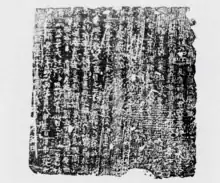Yujiulü Cheluhui
Yujiulü Cheluhui (Chinese: 郁久閭車鹿會; pinyin: Yùjiǔlǘ Chēlùhuì) was ruler and tribal chief of the Rourans, succeeded Mùgǔlǘ (Mugului) and was the son of the same,[1] his year of birth is unknown. He was a rough man and his government was marked by nomadism and peace.
| Yujiulü Cheluhui 郁久閭車鹿會 | |||||
|---|---|---|---|---|---|
| Tribal chief | |||||
 In the Gobi Desert, Mugulü passed through the Gobi in order to escape from his pursuers, his son, with his tribe already established, traveled through the Gobi. | |||||
| Tribal chief of the Rouran tribe | |||||
| Reign | 4th century | ||||
| Predecessor | Yujiulü Mugulü | ||||
| Successor | Yujiulü Tunugui | ||||
| Regent | Yujiulü Tunugui | ||||
| Died | 4th century | ||||
| Issue |
| ||||
| |||||
| House | Yujiulü clan | ||||
| Father | Yujiulü Mugulü | ||||
| Occupation | Xianbei soldier, warrior | ||||
| Yujiulü Cheluhui | |||||||
|---|---|---|---|---|---|---|---|
| Chinese | 郁久閭車鹿會 | ||||||
| |||||||
Government
Migration and peace
He gathered his Rouran subordinates. During their reign, the Rourans did not fight, they wandered peacefully, crossing the Gobi Desert like nomads in the winter and moved south and returned north in the summer to live. Rouran was a nomadic country. Although they established the tribe, they still belonged to Tuoba Wei and Xianbei and contributed to them with skins and horses.[2]
Heroism and the "tribal meeting"
After Mugulü's death, his son Cheluhui, noted for being heroic and vigorous, gather the multitude into a tribal confederation, whose self-name was "Rouran", later derisively changed to "Ruru" ~ "Ruanruan" by Emperor Taiwu of Northern Wei, who considered them ignorant and worm-like in appearance. The Yujiulü family began to have a group of people, self-commanding and self-proclaimed Rouran. Later, he would be succeeded by his son, Tunugui, son of Cheluhui and grandson of Mugulü.[3]
See also
Bibliography
Primary Sources
- "Book of Wei" (Volume 103 - Account 91) (in Chinese)
- "History of the Northern Dynasties" (Volume 98 - Account 86) (in Chinese)
References
- Grousset (1970), pp. 61, 585, n. 91.
- Weishu, vol. 103 "車鹿會既為部帥,歲貢馬畜、貂豽皮,冬則徙度漠南,夏則還居漠北。"Cheluhui, since made tribal chief, every year tributed domesticated horses and skins of martens and seals. In winter, they [Rourans] moved southwards across desert; in summer they returned to dwell north of the desert."
- Weishu, vol. 103 "車鹿會死,子吐奴傀立"
